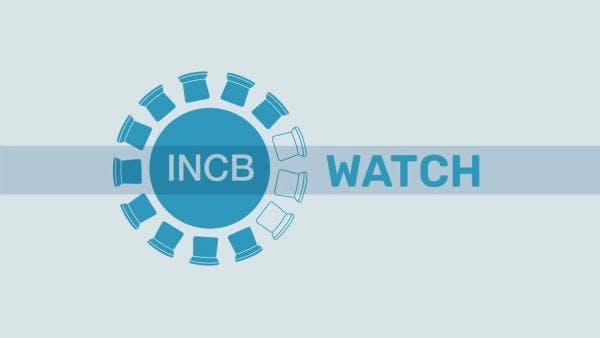INCB Watch April 2016 - Elections at the International Narcotics Control Board 2016
There will be elections affecting seven of the thirteen-member INCB in April 2016. The INCB or 'Board' is a relatively powerful institution within the United Nations-administered international drug control regime, and is mandated to oversee compliance with the drug control conventions. Elections to the INCB are of particular significance at the moment. The international drug control regime is in a state of transition from a punitive orientation to one in which public health and human rights are assuming a much greater salience.
Historically, the INCB has represented the centre of the conservative forces resisting change, but now appears unable to insulate itself from the tide of reform. The approaching set of elections may have great significance for the direction in which the Board turns in the build up to the High Level review in 2019, and in relation to change more generally.
The thirteen members who make up the INCB are elected to their posts by the Economic and Social Council (ECOSOC), from a selection nominated by the WHO and Member States. These arrangements are stipulated by the 1961 Single Convention, under which three of thirteen are chosen from a list of five names put forward by the WHO, and ten from a list nominated by UN Member States. As a result of the transitional provisions of the 1972 Protocol amending the 1961 Single Convention, in practice the terms of office of seven of the INCB members expire after two years. They are replaced by two candidates nominated by WHO and five by Member States. INCB members are elected by secret ballot.
The 2016 WHO-nominated candidates consist of:
- Mohammed Tamouth Abou-Saleh (Syria)
- Cornelis de Joncheere (The Netherlands)
- Richard Mattick (Australia, re-election)
- Lukas Radbruch (Germany)
- Emran Razaghi (Iran)
The 2016 Member States-nominated candidates are:
- Parviz Afshar (Iran)
- Sevil Atasoy (Turkey)
- Chafika Bensaoula (Algeria)
- Wolfgang Artur Goetz (Germany)
- Luz María Gonzalez Abrego (Panama)
- David T. Johnson ( U.S.A, re-election)
- Galina Aleksandrovna Korchagina (Russian Federation)
- Amalia Margarita Laborde Garcia (Uruguay)
- Ana dos Passos da Conceição Mamede Graca (Angola)
- Alejandro Mohar Betancourt(Mexico, re-election)
- Maria Lucia Oliveira de Souza (Brazil)
- Luis Alberto Otarola Penaranda (Peru)
- Lahcène Saadi (Algeria)
- Ahmed Kamal El Din Samak (Egypt, re-election)
- Sri Suryawati (Indonesia, re-election)
- Luis Yarzabal (Uruguay)
- Fadi Mustafa Yousef Alattiat (Jordan)
The INCB is currently finely balanced between those holding progressive views on most of the issues with which it deals and those who continue to oppose any reform to the regime. The forthcoming elections are, consequently, of particular importance. IDPC will follow the elections closely, reporting back on the outcome of the voting and the likely repercussions of the views held by the Board's new membership.
Keep up-to-date with drug policy developments by subscribing to the IDPC Monthly Alert.
Thumbnail: INCB Report
Regions
Related Profiles
- International Narcotics Control Board (INCB)
